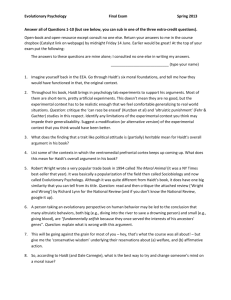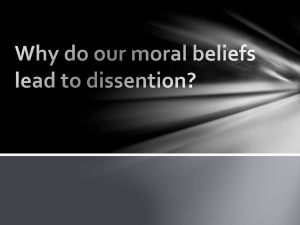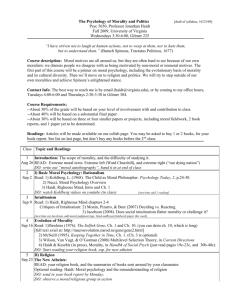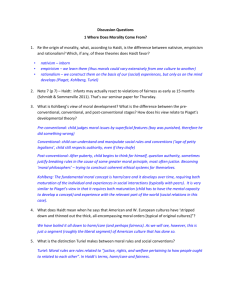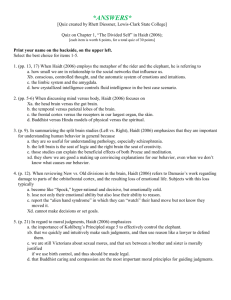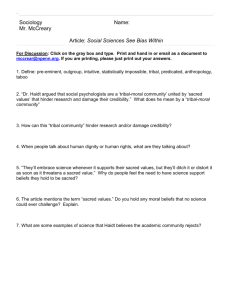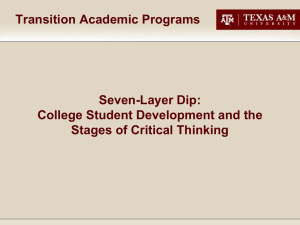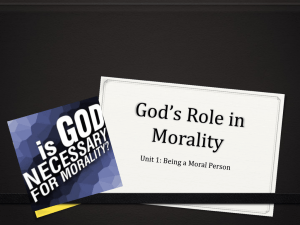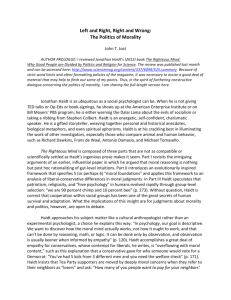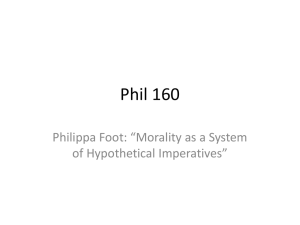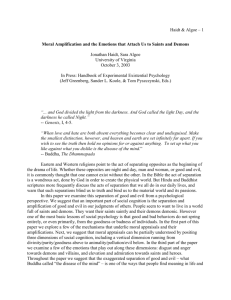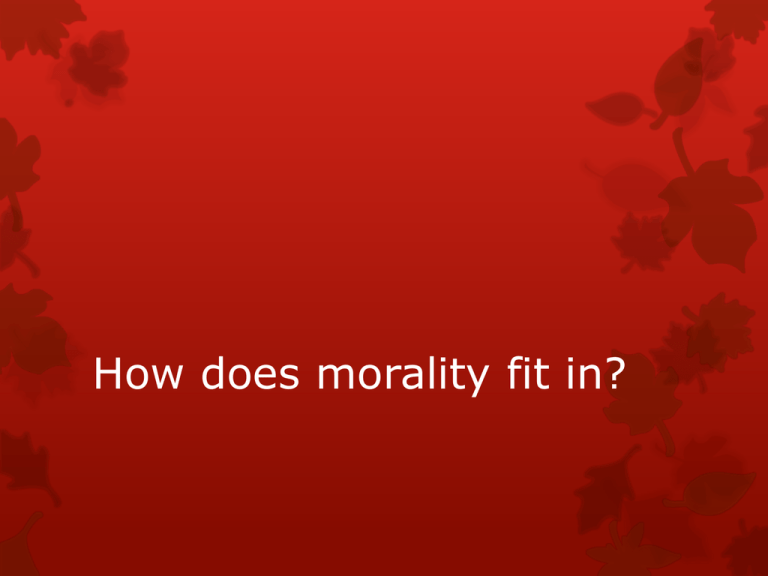
How does morality fit in?
GET MOVING ON
YOUR PROJECTS!
Yourmorals.org
What did you think of the scale?
Were your results as you expected?
What are the differences between equity
and equality?
What factors other than values might
affect how people respond?
What leads people to have these values?
Haidt, 2012
What is moral reasoning, according to
Haidt?
What are examples of moral issues on
which we have automatic responses?
How do we assess whether they are
automatic?
Rider on an elephant metaphor—good
one? What does it suggest?
Development of morality
What are the nativist vs. empiricist vs.
rationalism explanations?
What are the implications of these approaches
(for where morality comes from, how to
change it, etc.)?
Piaget
http://www.usefulcharts.com/psychology/piag
et-stages-of-cognitive-development.
Kohlberg
http://www.usefulcharts.com/psychology/kohl
berg-stages-of-moral-development.html
Carol Gilligan’s stages
Gilligan's Stages of the Ethic of Care
Approximate Age
Stage
Range
Goal
not listed
Goal is individual
survival
Preconventional
Transition is from selfishness -- to -- responsibility to others
not listed
Conventional
Self sacrifice is
goodness
Transition is from goodness -- to -- truth that she is a
person too
maybe never
Postconventional
Principle of
nonviolence: do
not hurt others or
self
More research on moral
development
What effects did these models have on
how people think about morality and
values?
What did Turiel add? Shweder?
What are sociocentric vs. individualistic
approaches to morality?
Haidt, Koller, & Dias, 1993
What does data show in terms of how
children and adults in various cultures
think about morality?
What are moral vs. social convention
violations?
What do Haidt’s data suggest about class
and morality?
What implications would this have?
Why would these differences exist?
Haidt, J., Koller, S. H., & Dias, M. G. (1993). Affect, culture, and morality, or is it wrong to eat your dog? Journal of Personality and
Social Psychology, 65(4), 613-628. doi:10.1037/0022-3514.65.4.613
© 1993 American Psychological Association
Haidt, J., Koller, S. H., & Dias, M. G. (1993). Affect, culture, and morality, or is it wrong to eat your dog? Journal of Personality and
Social Psychology, 65(4), 613-628. doi:10.1037/0022-3514.65.4.613
© 1993 American Psychological Association
Haidt, J., Koller, S. H., & Dias, M. G. (1993). Affect, culture, and morality, or is it wrong to eat your dog? Journal of Personality and
Social Psychology, 65(4), 613-628. doi:10.1037/0022-3514.65.4.613
© 1993 American Psychological Association
Haidt, J., Koller, S. H., & Dias, M. G. (1993). Affect, culture, and morality, or is it wrong to eat your dog? Journal of Personality and
Social Psychology, 65(4), 613-628. doi:10.1037/0022-3514.65.4.613
© 1993 American Psychological Association
The worship of reason
What are the possible relationships between reason
and emotion? Plato vs. Jefferson vs. Hume
Which view does Haidt support?
Roach juice and selling soul—why did only 30%
agree?
Sibling sex and eating person—how do people
respond to these types of moral issues?
What is Margolis’s distinction between “seeing
that” and “seeing why”?
What are some political examples of how we use
moral reasoning to try to explain to others why
they should agree with us?
Changes in moral thinking
How do moral decisions get made and
change in Haidt’s model?
How does his model suggest we should try
to change opinions?
Why doesn’t reasoning with someone
work?
Haidt’s evidence for automatic
intuition then justification
1. Brains constantly evaluate.
2. Social and political judgments are
especially like to be automatic.
3. Bodies guide judgments.
4. Psychopaths reason but don’t feel.
5. Babies feel but don’t reason.
6. Feelings are affected by outside
influences.
Accountability
What is the idea of Tetlock’s intuitive
politician?
When does accountability make us really
think through the issues?
How does Leary’s “sociometer” idea fit in?
When, what, and how well do we
rationalize?
How do we vote, according to Haidt? How
would his approach explain poor people
voting for conservative policies, for
example?
Intuitions
What else do our intuitions do for us?
What else is automatic and how does that
serve us?
Are some people better at justifying than
others? What about at persuading/seeing
the other’s point of view?
Why do we want to be seen as moral?
Comparisons
Is Haidt’s approach consistent with other
approaches we’ve talked about this semester?
Cognitive dissonance theory
System justification
TMT
What other concepts seem familiar?
What does Carnegie suggest? How does that
fit with research?
How does Haidt view religion?

